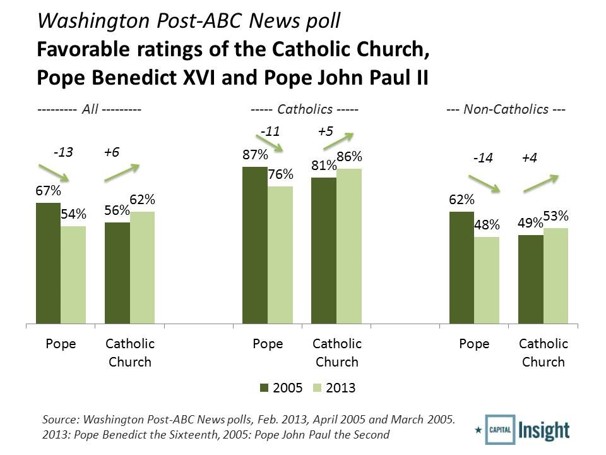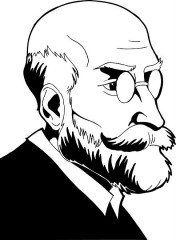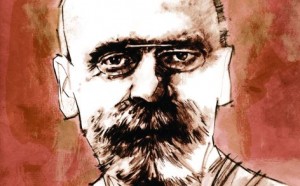 At the end of my last blog I wrote that Durkheim believed that most epistemological problems resulted from individualism, a point I would like to develop further in relation to religion by referring, once again, to Anne Warfield Rawls’ book Epistemology and Practice: Durkheim’s The Elementary Forms of Religious Life (Cambridge, 2004). Moreover, in doing so, it will be shown that Durkheim had great respect for archaic religions – a position many of his contemporaries did not hold. Continue reading
At the end of my last blog I wrote that Durkheim believed that most epistemological problems resulted from individualism, a point I would like to develop further in relation to religion by referring, once again, to Anne Warfield Rawls’ book Epistemology and Practice: Durkheim’s The Elementary Forms of Religious Life (Cambridge, 2004). Moreover, in doing so, it will be shown that Durkheim had great respect for archaic religions – a position many of his contemporaries did not hold. Continue reading
Monthly Archives: February 2013
Catholic Public Opinion Research in the Wake of Pope Benedict XVI’s Resignation
With Pope Benedict XVI’s resignation, the news media has found it a good time to discuss public opinion research on Catholic related issues. For instance, The Washington Post has an article today entitled “Benedict XVI leaves as popular pope, but no John Paul II,” which discusses favorability ratings of the Catholic Church, Pope Benedict XVI, and Pope John Paul II. Looking at the graphic, I found it interesting that while both Catholics and non-Catholics in the U.S. have a less favorable impression of Pope Benedict XVI than they had of Pope John Paul II at the end of his papacy, both Catholics and non-Catholics now rate the Catholic Church more favorably than they did in 2005. It is interesting to speculate on why there might be an increase in favorable impressions by Catholics (and non-Catholics) toward the Catholic Church. Perhaps the higher rating is due to stricter standards regarding clerical sex abuse on behalf of Church leaders, as well as the fact that more time has passed since the clerical sex abuse crisis came to forefront of media attention in 2002. Such findings also show that the Catholic Church is still rated favorably by those who self-identify as Catholic, despite most American Catholics not attending Mass weekly.
Turning to Pope Benedict XVI’s favorability, it is worthwhile to note that the graphic accords with previous research by the Pew Forum on Religion & Public Life, which in August of 2012 found that 74% of Catholics were satisfied with the leadership of the pope. Thus, overall Catholics view Pope Benedict favorably.
Feel free to post any other interesting articles related to public opinion research on Catholics that you have come across since Pope Benedict XVI’s resignation in the comment section below.
Durkheim (cont’d)
My last blog on Durkheim may have left some a little unclear as to the distinction Durkheim makes between his epistemology and his sociology of knowledge. My hope is that the following might help clear up this distinction and, if it does not, that readers will be drawn to read Anne Warfield Rawls’ article on this topic (“Durkheim’s Epistemology: The Neglected Argument” 1996, AJS, 102[2]). Nevertheless, Rawls believes that this distinction is a major point of confusion about Durkheim’s work. As the abstract to her article states: Continue reading
A Pope Resigns!
Scholars will, undoubtedly, be discussing this historic day in Catholicism for years to come. While there is not a great deal of scholarship on the papacy by sociologists of religion, we’d be remiss as bloggers to not mention this historic moment.
One of the most clear and insightful accounts I have seen thus far is “Can a Pope Resign?” by Fr. Thomas J. Reese, SJ in The National Catholic Reporter.
I did quickly do some research to see if there had been any social scientific analysis of this papacy, and found just one recent piece “Benedict the Bifurcated: Secular and Sacred Framing of the Pope and Turkey” authored by Valenzano and Menegatos and published by the Journal of Media and Religion in 2008.
Feel free to react to the resignation or to note other insightful accounts in the comments.
Church and State Rolls On
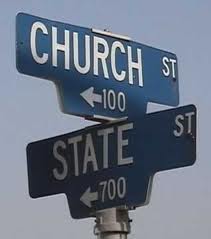 The past twelve months have seen a number of conflicts within the realm of what Americans often call “church-state issues.” The contraception mandate argument in healthcare reform gave way to last summer’s “Fortnight for Freedom.” Last week, as I was writing this post, breaking news suggested the Obama administration has shifted course, providing an exemption from contraceptive coverage for religious non-profits.
The past twelve months have seen a number of conflicts within the realm of what Americans often call “church-state issues.” The contraception mandate argument in healthcare reform gave way to last summer’s “Fortnight for Freedom.” Last week, as I was writing this post, breaking news suggested the Obama administration has shifted course, providing an exemption from contraceptive coverage for religious non-profits.
Church and state seem to spend a lot of time interacting. Why? And what does it mean for church, and state?
For many Americans, it might be a surprise to know that the familiar phrase, “separation of church and state,” is not in the Constitution. It comes from a letter Thomas Jefferson wrote to a group of Baptists. By the middle of the 20th Century, this phrase had become a powerful metaphor, shaping both the Supreme Court’s view and the mindsets of many, if not most, religious persons. Over 200 years, the pattern of interaction between church and state has drastically changed, with different phases along the way. Continue reading
“Not Called to Do Everything, but Called to Do Something”: A March for Life Reflection
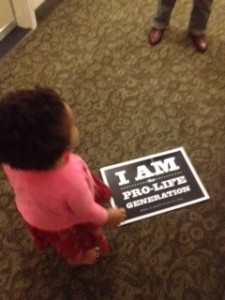 I had never participated in the annual March for Life before January 25, and I have to admit, I’d been a bit nervous about attending for the first time. Don’t get me wrong, the Catholic Church’s consistent prolife ethic, “from conception to natural death,” is one of her teachings which I find at once fully coherent, tremendously countercultural, undeniably Scriptural and personally challenging. And I have seen many examples of the commitment of so many Catholics to a vision of human life as a “seamless garment,” a phrase from John 19:23 taken up by pacifist Eileen Egan to describe a holistic reverence for life’s sacredness and the consistent application of an ethic of life on issues such as abortion, capital punishment, militarism, euthanasia, and social and economic injustice. Continue reading
I had never participated in the annual March for Life before January 25, and I have to admit, I’d been a bit nervous about attending for the first time. Don’t get me wrong, the Catholic Church’s consistent prolife ethic, “from conception to natural death,” is one of her teachings which I find at once fully coherent, tremendously countercultural, undeniably Scriptural and personally challenging. And I have seen many examples of the commitment of so many Catholics to a vision of human life as a “seamless garment,” a phrase from John 19:23 taken up by pacifist Eileen Egan to describe a holistic reverence for life’s sacredness and the consistent application of an ethic of life on issues such as abortion, capital punishment, militarism, euthanasia, and social and economic injustice. Continue reading
How Durkheim is Repeatedly Misinterpreted: A Conversation Starter
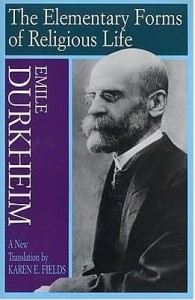 I critique Vasquez’s interpretation of Emile Durkheim in his chapter “Grappling with the Legacy of Modernity: Implications for the Sociology of Religion,” in Religion on the Edge: De-Centering and Re-Centering the Sociology of Religion (2013, Oxford University Press). Vasquez, of course, is not the only sociologist that misinterprets Durkheim, and I base this evaluation not on any great epiphany of my own but on the work of Anne Warfield Rawls – my professor long ago (Anne is the daughter of the philosopher John Rawls). Her continuing work on Durkheim has not only been an inspiration but it has helped me think clear headedly about Durkheim’s work (see in particular her 2004 book Epistemology and Practice: Durkheim’s The Elementary Forms of Religious Life, Cambridge University Press). I also appreciate Vasquez’s work, especially his recent book More Than Belief (2010, Oxford University Press) and the chapter I mentioned above, but, nevertheless, he gets Durkheim wrong. My purpose below then is to simply provide the reader with several quotes from Rawls’ book that debunks the notion that Durkheim had an idealist turn and, secondly, to start a further conversation about Durkheim’s work. Continue reading
I critique Vasquez’s interpretation of Emile Durkheim in his chapter “Grappling with the Legacy of Modernity: Implications for the Sociology of Religion,” in Religion on the Edge: De-Centering and Re-Centering the Sociology of Religion (2013, Oxford University Press). Vasquez, of course, is not the only sociologist that misinterprets Durkheim, and I base this evaluation not on any great epiphany of my own but on the work of Anne Warfield Rawls – my professor long ago (Anne is the daughter of the philosopher John Rawls). Her continuing work on Durkheim has not only been an inspiration but it has helped me think clear headedly about Durkheim’s work (see in particular her 2004 book Epistemology and Practice: Durkheim’s The Elementary Forms of Religious Life, Cambridge University Press). I also appreciate Vasquez’s work, especially his recent book More Than Belief (2010, Oxford University Press) and the chapter I mentioned above, but, nevertheless, he gets Durkheim wrong. My purpose below then is to simply provide the reader with several quotes from Rawls’ book that debunks the notion that Durkheim had an idealist turn and, secondly, to start a further conversation about Durkheim’s work. Continue reading
